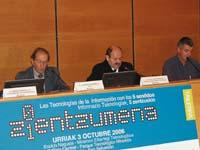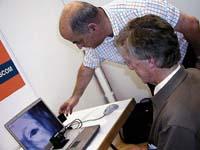Exposure of the virtual senses

The protagonists of sci-fi stories often have artificial senses. Thanks to them, they receive extensive information about the environment, wider than we can receive normal people, and their interaction with the environment is different. What for us is a border is not an obstacle to them.
From science fiction to reality, scientists have taken great steps in the digitization of the senses and in the development of artificial senses. This was announced last month at the Miramon Technology Park in San Sebastian, through a day entitled Zientziumena.
The conference, organized by the UPV-EHU, the Diputación Foral de Gipuzkoa and Bic Berrilan, was attended by experts who exposed the advances made in a couple of fields: tools or applications developed by people with disabilities to overcome their limitations and, on the other hand, food/gastronomy.
To compensate for limited senses, researchers use two ways. In one of them they try to replace the limited sense by another. As an example of this, the day had an application that sounds texts written on the Internet.

The other way is to increase sensory capacity through external sensors. For example, the Iriscom application allows people with reduced mobility to use the computer by moving the eyes. Another example is the autonomous wheelchair.
As for food and gastronomy, the stars of the senses were smell and taste. For example, they explained the evolution of the electronic language and showed the tool developed at the Institute of Microelectronics of Barcelona. In addition, a researcher at the Standford University presented the Fere Screen application. On the computer screen, this instrument generates a liquid layer with the desired flavor. The same does, but with odors, Active Vortex, since this system generates the desired smell and, how not, there was an electronic nose, NELAS.
It was a day to put all the senses on alert. However, the researchers recognized that the time of the substitution of the senses by artificial systems is still far away. Yes, they showed that spectacular and useful advances are being made.
Buletina
Bidali zure helbide elektronikoa eta jaso asteroko buletina zure sarrera-ontzian











